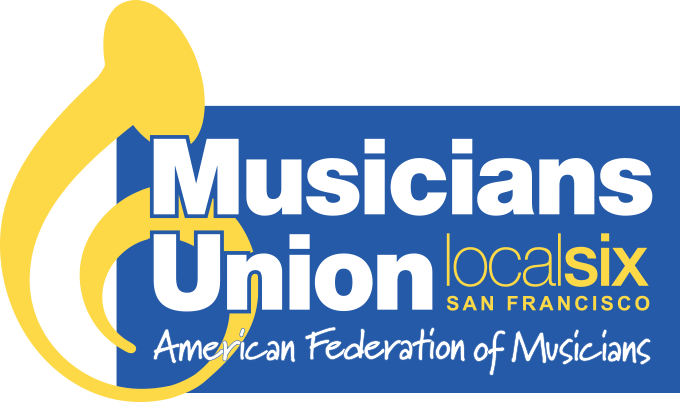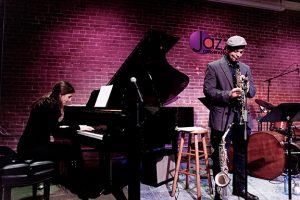
Anne Sajdera, piano, and Lyle Link, saxophone.
Photo: Susan Bradley
By Mario Guarneri
Dear Colleagues,
What if the genre of music you love and to which you have devoted years of practice, offered very few professional performance opportunities? Imagine if a high percentage of those opportunities didn’t even pay a guaranteed wage, and those that did, guaranteed around $90 per musician for 3-4 hours of work.
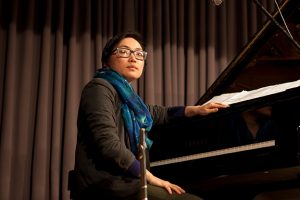
Erika Oba, piano. Photo: Susan Bradley
Freelance “classical” musicians are underpaid and underappreciated. However, when they do play, at least they know what they will be paid. Freelance jazz performers are stuck with a different model. Pay for most jobs is based on a percentage of the door or the bar; a tip jar; or some combination of those.
It’s a vicious circle, with no union jobs and no incentive to join the union, resulting in unrepresented workers getting low paying jobs and poor working conditions. And because organizing must be grassroots— it can’t be directed from the top; workers themselves need to take action — the cycle can’t be broken until enough musicians get fed up with the situation and seek an alternative.
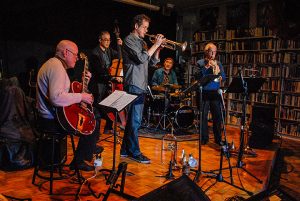
Randy Vincent, guitar, John Wiitala, bass, Erik Jekabson, trumpet, Akira Tana, drums, Mario Guarneri, trumpet. Photo: Guiseppe Dezza
As the Founder and Artistic Director of Jazz in the Neighborhood (JitN), I am committed to improving working conditions for professional jazz musicians. Our mission also includes educating the public and musicians about what’s wrong with the current model and what can be done to change things.
This past season we collaborated with Local 6 on forty concerts in Rendon Hall in Berkeley and very much appreciated their underwriting of a portion of our expenses. In January of this year we booked only union musicians for four concerts at the Open Secret bookstore in San Rafael as a Music Performance Trust Fund series. Five of the jazz musicians on our roster joined the union as a result of this collaboration. We paid them at a chamber music performance scale rate and also made work dues and pension contributions. Throughout the rest of this year, JitN plans to present more concerts under union conditions. We also have given the union a list of venues and presenters that we feel need to be contacted and encouraged to collaborate with the union.
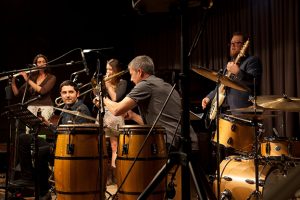
Rebecca Kleinman, flute, Ian Faquini, guitar, Natalie Cressman, trombone, Brian Rice, percussion, Scott Thompson, bass.
Photo: Susan Bradley
Union support gives us more status with our musician colleagues and the jazz community in general. JitN sees the union as having more leverage with public policy makers and more visibility through the contacts it has created for working musicians in the Bay Area. If there is a pathway for bringing jazz musicians back into the union, organizations like JitN can serve as a conduit for them. We have presented over 300 concerts in the past 5 years. More than 500 musicians on our roster have been paid a fair guaranteed wage, ($150/musician plus 10% for the leader). We are trusted and respected in the jazz community and the union collaboration has started a conversation about how we can work together for the future. A union that is inclusive of all musical genres is obviously stronger. In addition to the benefits of a larger financial base, the public perception of live music and Bay Area based musicians being paid as professionals becomes a shared value.
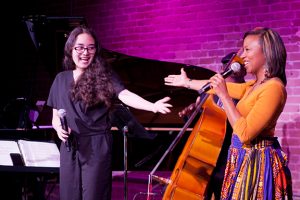
Emerging artist Tai Min, vocals and drums, with Tiffany Austin, vocals. Photo: Susan Bradley
Here are some ways you can help us with our mission:
- Let Local 6 officials know that you support their efforts to help freelance jazz musicians. It improves the image of the union’s importance in the jazz community which is a big factor in bringing back this genre into the union.
- Educate the public about the economics of freelance performing artists.
- Support the venues that are paying a guaranteed fair wage. Contact us and we will be happy to let you know which venues those are.
- Educate your colleagues and the public about what is going on and support our efforts by not putting a few bucks in a tip jar, but instead donating to organizations that are changing the situation.
- Finally, those of you who have achieved the goal of working under a CBA, please consider using that status to help your less fortunate colleagues. Make sure every musician hired by your organization makes a union wage, including musicians hired for after concert parties, galas, and school concerts that may not be under your CBA. Solidarity works. In fact, in this situation it might be the only thing that works.
In Solidarity,
Mario Guarneri
Local 6 Member
www.jazzintheneighborhood.org
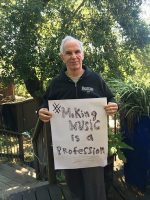
Mario Guarneri
Mario Guarneri was born and raised in the Bay Area and at the age of 13 joined Local 6. The early part of his career was spent in Los Angeles playing trumpet with the LA Philharmonic, LA Chamber Orchestra, LA Opera, and studio work in movies and TV. He returned to the Bay Area 27 years later and worked with the SF Symphony, SF Opera, SF Ballet and did some theatre work. He also contracted orchestras at Skywalker Sound (all under union contracts). He has taught at the SF Conservatory of Music since 1992 and has recorded 4 CD’s with his own jazz group.
